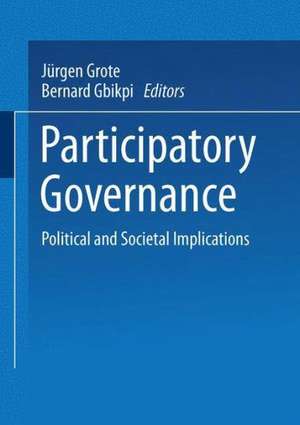Participatory Governance: Political and Societal Implications
Editat de Jürgen Grote, Bernard Gbikpien Limba Engleză Paperback – 31 ian 2002
Preț: 384.09 lei
Nou
Puncte Express: 576
Preț estimativ în valută:
73.50€ • 78.59$ • 61.28£
73.50€ • 78.59$ • 61.28£
Carte tipărită la comandă
Livrare economică 18 aprilie-02 mai
Preluare comenzi: 021 569.72.76
Specificații
ISBN-13: 9783810032379
ISBN-10: 3810032379
Pagini: 276
Ilustrații: 275 p.
Dimensiuni: 148 x 210 x 14 mm
Greutate: 0.32 kg
Ediția:2002
Editura: VS Verlag für Sozialwissenschaften
Colecția VS Verlag für Sozialwissenschaften
Locul publicării:Wiesbaden, Germany
ISBN-10: 3810032379
Pagini: 276
Ilustrații: 275 p.
Dimensiuni: 148 x 210 x 14 mm
Greutate: 0.32 kg
Ediția:2002
Editura: VS Verlag für Sozialwissenschaften
Colecția VS Verlag für Sozialwissenschaften
Locul publicării:Wiesbaden, Germany
Public țintă
ResearchCuprins
1. From Democratic Government to Participatory Governance.- Governance: Concepts.- 2. Contextualizing Normative Standards for Legitimate Governance beyond the State.- 3. Participation in Governance Arrangements: Is there any Reason to Expect it will Achieve “Sustainable and Innovative Policies in a Multilevel Context”?.- 4. Governance: A Social-Political Perspective.- 5. Civic Perspectives on a Democratic Transformation of the EU.- Governance: Institutions.- 6. The European Commission: Promoting EU Governance.- 7. The Effects of European Integration on National Forms of Governance: Reconstructing Practices and Reconceptualizing Democracy.- 8. Regions in Multilevel Governance Arrangements: Leadership versus Partnership.- Governance: Sectors and Domains.- 9. Democratising Expertise.- 10. Environmental Governance: From Innovation to Powerlessness.- 11. Private Actors in Political Governance: Regulating the Information and Communication Sectors.- Conclusion.- 12. Participation and Meta-Governance: The White Paper of the EU Commission.
Notă biografică
Jürgen R. Grote, Fakultät für Politik- und Verwaltungswissenschaften, Universität Konstanz; Bernard Gbikpi, Fellow in einem gemeinsam mit Philippe C. Schmitter und Claus Offe durchgeführten Projekt über "Democracy Promotion and Protection in Central Europe and the Middle East and North Africa".
Textul de pe ultima copertă
After years of a primarily and technocratic debate on European governance, it is time to emphasize the term´s normative dimension. This book singles out participation as the issue most crucial to it. Participatory governance is introduced not as part of the problem but as part of the solution. Going beyond Robert Dahl´s democratic dilemma, the contributors try to identify and describe modes of governance based on system effectiveness cum citizen participation. The concept is first developed in a theory section and then followed by chapters on the multi-level and the multi-sector contexts within which its empirical manifestations are travelling. A conclusion comments on the White Paper on Governance by the European Commission and on the implications of likely governance failure.
This has been made possible by a generous grant of the EU Commission under the Fifth Framework Programme on Research and Development.
This has been made possible by a generous grant of the EU Commission under the Fifth Framework Programme on Research and Development.





